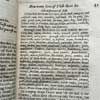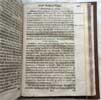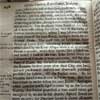Healths Improvement;
OR, Rules Comprizing and discovering The Nature, Method, and Manner of Preparing all sorts of FOOD Used in this NATION. (A single flat line) Wriiten by that ever Famous THOMAS MUFFETT, Doctor in PHYSICK: (A single flat line) Corrected and Enlarged BY CHRISTOFER BENNET, Doctor in Physick, and Fellow of the College of Physicians in London. (A single flat line) LONDON, Printed by Tho: Newcomb for Samuel Thomson, at the sign of the white Horse in Pauls Churchyard, 1655.
FIRST EDITION. Small 4to. 190 x 146 mm. 1fep. Title page. [2] Imprimatur page. (1)2-8 The Table. 2pages To the Reader. 1-296. 1 fep. Full dark brown sheep. Blind tooling to covers and spine. Gilt lettering and red leather label with gilt lines. A very light small water stain on upper corner of the title page and next four pages, not affecting text, otherwise, almost as new. Some occasional marginalia in a neat hand. Many bibliographical sources printed in margins. An exceptionally nice clean copy of a very scarce book.
- There exists a varied number of ways that Muffett (as spelled in this edition) is written. Cagle shows at least six ways. He also states Moffett is preferred by NUC, Mouffet by BMC, and Muffett by BNC. For the sake of filing them together on this site, I have used the later 'Moffet'. In an interesting historical thesis featuring Thomas Muffett, written and posted online by Christopher A. DeAngelo of Haverford College, PA, USA, who starts his dissertation with the famous poem:- “Little Miss Muffet sat on her tuffet / Eating her curds and whey / Along came a big spider / And sat down beside her / And frightened Miss Muffet away!”. Mr DeAngelo further states; "Thomas Muffet, the 16th century English natural philosopher, is best known today for the above nursery rhyme. He apparently wrote it about his daughter. Some people have even suggested that the poem refers to Muffet’s experiments on his daughter with spiders, which led to her being deathly afraid of them for the rest of her life. Despite the wide acceptance of these claims, there is no historical evidence to support any of them. Whether or not Muffett had anything to do with the actual writing of the poem, it is undeniably linked to him. The poem includes two concrete allusions to Muffett’s work. The spider is a direct reference to Muffett’s ‘Theatrum Insectorum’, in which the largest section deals with the classification of spiders. The curds and whey come straight out of ‘Healths Improvement’, where Muffett named curds and whey (both milk products) as essential to a good diet". Thomas Moffett was born in 1553 and died in 1604, so it must be assumed that the Christofer Bennet mentioned in the title page of ‘Healths Improvement’ who corrected and enlarged the book, was the first one to edit Muffett’s manuscript notes. One must then wonder how much he added and what exactly is Muffett’s original work. Whatever the truth, this is a very interesting work. It is also the first work to list British wild fowl and to comment on their migrations.






click on image to enlarge

Antiquarian category
ref number:
11232